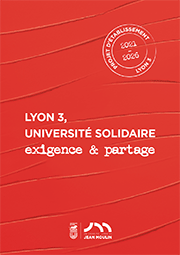AccueilRechercheLes productions scientifiquesThèsesThèses soutenuesThèses soutenues - 2006-2020Thèses soutenues - 2011
-
Partager cette page
- Recherche,
FRASSON-QUENOZ Florent
La construction de la communauté de sécurité africaine : une perspective africaine.
Publié le 11 avril 2011 – Mis à jour le 19 juillet 2017
Thèse en Droit - Sécurité internationale et défense soutenue le 12 mai 2011
Les difficultés rencontrées pour assurer le maintien de la paix et de la sécurité internationale sur le continent africain constituent un réel obstacle au développement économique, un danger pour les populations et une menace sérieuse pour la survie des Etats.
Les outils théoriques classiques de la sécurité internationale s’étant révélés insuffisants pour apporter une réponse à cette problématique, notre objectif est ici, en recourant à l’approche constructiviste, de déterminer si les États africains manifestent une réelle volonté et/ou capacité à construire une communauté de sécurité (CS) à même de palier ces difficultés.
Pour ce faire nous nous interrogeons sur l’existence d’un lien entre la production d’actes de parole, la promotion et l’adoption de normes de régulation pacifiques des conflits et la manière qu’ont les États africains d’appréhender leurs relations avec les autres membres de la CS supposée.
L’utilisation additionnelle du concept de région et l’adoption d’une perspective africaine nous permettent en outre de diviser l’objet d’étude « Afrique » en plusieurs sous-ensembles plus propices à la réalisation d’une étude scientifique et d’évaluer d’une part la pertinence et d’autre part le sens même du concept de CS lorsqu’il est appliqué au terrain africain.
The difficulties met to insure the preservation of the peace and the international security on the African continent constitute a real obstacle to the economic development, a danger for the populations and a serious threat for the survival of States.
The classic theoretical tools of the international security having proved insufficient to provide an answer to this issue, our objective is to determine, on the basis of the constructivist approach, whether African States show a real willingness andor a capacity to build a Security Community (SC) that would be able to overcome these difficulties.
In order to do so we question whether a link exists between the production of “speech acts” on the one hand and the promotion and the adoption of pacific regulation norms for conflicts on the other, and we examine the way African States apprehend their relations with other members of the supposed SC.
The additional use of the concept of “region” and the adoption of an African perspective allow us to divide the object of study "Africa" into several subsets more propitious to the achievement of a scientific study, and to evaluate the relevance and the meaning of the SC concept when applied to the African field of study.
Mots clés : Sécurité internationale, Communauté de sécurité, sécurité humaine, architecture de sécurité africaine, Droit international public, Histoire, Panafricanisme, Afrique, Afrique du Sud, Côte d'Ivoire, société civile et autorités "traditionnelles"
Key words : International security, security community, human security, structures of African security, International law, History, Pan-Africanism, Africa, South Africa, Côte d’Ivoire, civil society and "traditional" authorities
Membres du jury :
Françis AKINDES, Professeur, Université de Bouaké
Michel-Louis MARTIN, Professeur, Université de Toulouse 1
Frédéric RAMEL, Université de Paris Sud
Frédéric MASSE, Professeur, Université Externado de Colombia
Président du jury : Francis AKINDES
Mention : Très honorable
Equipe d'accueil : CLESID
Les outils théoriques classiques de la sécurité internationale s’étant révélés insuffisants pour apporter une réponse à cette problématique, notre objectif est ici, en recourant à l’approche constructiviste, de déterminer si les États africains manifestent une réelle volonté et/ou capacité à construire une communauté de sécurité (CS) à même de palier ces difficultés.
Pour ce faire nous nous interrogeons sur l’existence d’un lien entre la production d’actes de parole, la promotion et l’adoption de normes de régulation pacifiques des conflits et la manière qu’ont les États africains d’appréhender leurs relations avec les autres membres de la CS supposée.
L’utilisation additionnelle du concept de région et l’adoption d’une perspective africaine nous permettent en outre de diviser l’objet d’étude « Afrique » en plusieurs sous-ensembles plus propices à la réalisation d’une étude scientifique et d’évaluer d’une part la pertinence et d’autre part le sens même du concept de CS lorsqu’il est appliqué au terrain africain.
The difficulties met to insure the preservation of the peace and the international security on the African continent constitute a real obstacle to the economic development, a danger for the populations and a serious threat for the survival of States.
The classic theoretical tools of the international security having proved insufficient to provide an answer to this issue, our objective is to determine, on the basis of the constructivist approach, whether African States show a real willingness andor a capacity to build a Security Community (SC) that would be able to overcome these difficulties.
In order to do so we question whether a link exists between the production of “speech acts” on the one hand and the promotion and the adoption of pacific regulation norms for conflicts on the other, and we examine the way African States apprehend their relations with other members of the supposed SC.
The additional use of the concept of “region” and the adoption of an African perspective allow us to divide the object of study "Africa" into several subsets more propitious to the achievement of a scientific study, and to evaluate the relevance and the meaning of the SC concept when applied to the African field of study.
Mots clés : Sécurité internationale, Communauté de sécurité, sécurité humaine, architecture de sécurité africaine, Droit international public, Histoire, Panafricanisme, Afrique, Afrique du Sud, Côte d'Ivoire, société civile et autorités "traditionnelles"
Key words : International security, security community, human security, structures of African security, International law, History, Pan-Africanism, Africa, South Africa, Côte d’Ivoire, civil society and "traditional" authorities
Membres du jury :
Françis AKINDES, Professeur, Université de Bouaké
Michel-Louis MARTIN, Professeur, Université de Toulouse 1
Frédéric RAMEL, Université de Paris Sud
Frédéric MASSE, Professeur, Université Externado de Colombia
Président du jury : Francis AKINDES
Mention : Très honorable
Equipe d'accueil : CLESID
Documentation
Mise à jour : 19 juillet 2017



